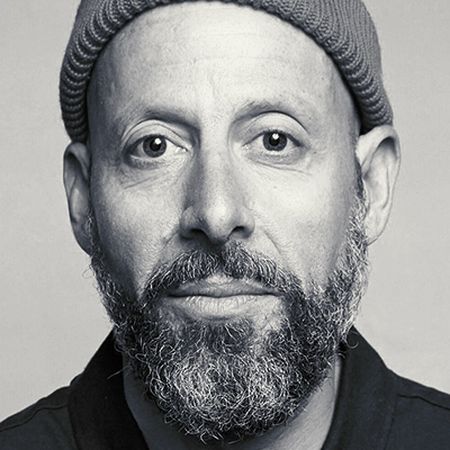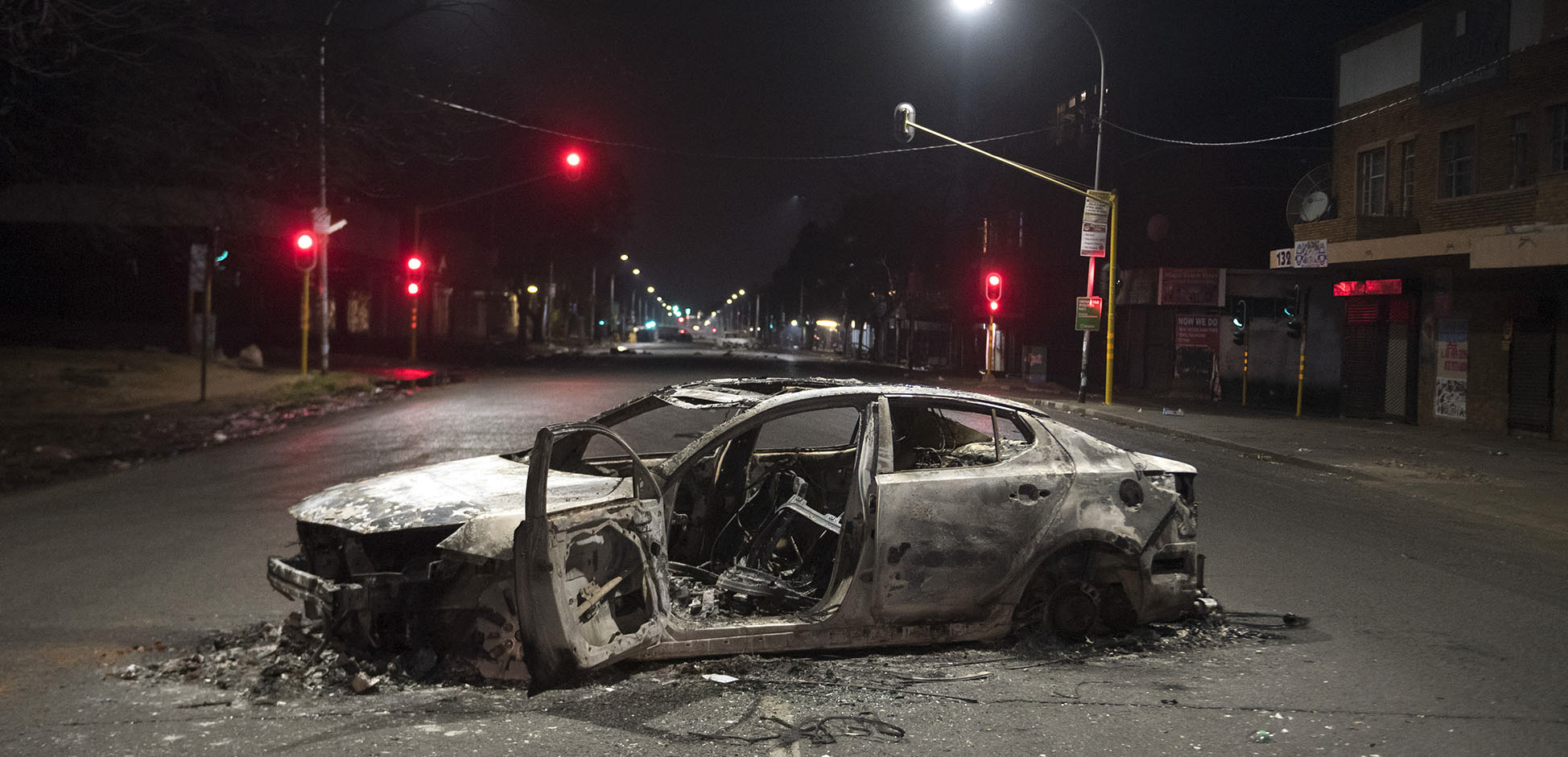It’s been a fine week for connoisseurs of civil unrest.
Across Gauteng and KwaZulu-Natal, two massive conflagrations have conjoined to form a devastating wildfire. The first was the rage manufactured by an organised criminal network that found opportunity in the incarceration of a political figurehead. The second was the instability caused by the desperation of a people crushed in an ever-tightening economic vice.
Following the arrest of former president Jacob Zuma last Wednesday, and after incitement from his hype squad – including his daughter Duduzile Zuma-Sambudla and a local radio DJ named Ngizwe Mchunu – KZN exploded into unprecedented mayhem, which is saying something for a province that experienced the worst of apartheid’s end-game violence. The scale of the ruin is already staggering, while the impotence of law enforcement has been a reminder of the disarray that defines the police and intelligence services, neither of which were prepared for the obvious upset following the former president’s jailing.
Stupidity like this deserves a standing ovation. Sadly, South Africa is on its knees. Entire communities have been razed, but more significantly – at least for those trying to calculate what the future might hold – the violence has targeted vital nodes of distribution: logistics capacity in Mooi River; local food and dry good stores throughout eThekwini; large malls and warehouse facilities along the coastline and up into Pietermaritzburg. Sasria, the state insurance agency, is on the hook for these costs, which ultimately means that taxpayers serve as guarantors. The damage is likely to amount to tens of billions of rands, but that’s only part of the cost. It will be nearly impossible to rebuild what has been burnt.
Own the supply chain, own the country: this is a basic tenet of warfare. And make no mistake, there is a plan. The trouble in KZN is much more than a political protest or a spontaneous statement of local anguish. Under the cover of Zuma’s jailing, this was a large, local gangster network flexing its muscles, saying:
We are here. Stop us if you can.
The state’s reply was as anaemic as it was articulate:
We can’t. Help yourself.
Ethnic shmethnic
Zuma’s opponents – aka nearly everyone on Earth – like to remind us that the former president has no real power; that his support has faded away with his political prominence; that his kids are drunk lunatics and not the lethal social media influencers they take themselves to be. But his arrest has dragged up something dark and vicious from the underworld bog in which he remains a representative daemon. South African elites are reflexively horrified by any talk of tribalism, but when it works in the ANC’s favour – as it did in the 2009 national elections that saw the party win a large majority in Zuma’s previously unseduceable home province – it gets smiled away as a topic not to be discussed in polite company. As in most African countries, tribal divisions were diligently maintained by successive white overlords for decades, and the wounds never healed. Zuma has made a career of exploiting them: it’s been the source of his power all along.
(These observations shouldn’t be confused with a certain opposition politician’s view that Zuma is a charming if guileless traditional chieftain who doesn’t know from fancy Western-style constitutionalism or democracy. In fact, Zuma is a highly methodical grifter who knows exactly what he’s doing, and who is both a populist and an adept at strumming white liberal passions.)
For another thing, as the “war against corruption” makes nominal gains by jailing former presidents and humiliating the ANC’s D-team in court, the fight for control of the gangster economy becomes commensurately vicious. There is nothing to lose and everything to gain by torching the country. Listed corporate entities are being informed, in the language of blood and fire, that South Africa is no longer a cozy environment in which to run their monopolies. The ensuing vacuum is being filled by what economists term “new entrants”.
It is, for example, no longer safe to truck goods into KZN, which serves as the successful culmination of a campaign to dislodge “foreign nationals” from the trucking industry: As of today, all roads into KZN are controlled by the mob. It is no longer safe to run a Shoprite, or a Checkers or a Woolworths, even in tiny Johannesburg retail spaces. These warnings represent the birth pangs of a Russian-style hyper-capitalist shadow economy, which threatens to become the real economy – a vision Zuma and his cabal in the State Security Agency hoped to initiate under his presidency.
Better late than never, as they say.
Speaking of late – Julius Malema, whose Economic Freedom Fighters have evolved into an effective shakedown crew in Johannesburg, Tshwane and beyond, has tried to tweet himself into the national free-for-all. “No soldiers on our streets! Otherwise, we are joining. All fighters must be ready… they won’t kill us all,” exclaimed Julius, who has a knack for avoiding personal involvement in the violent protests he initiates. Meanwhile, in the Eastern Cape, taxi industry leaders and Premier Oscar Mabuyane have been in talks to protect the province from looting. These new racketeering alliances are the future of South Africa: the gangster economy has become fully integrated into the remnants of the “real” economy. Hoods, assassins, ex-spooks and drug dealers are now partners at the table.
It no longer matters how much a CEO bench-presses, or how many minutes he dedicates to Mandela Day, or how much viognier his wine farm produces. A new age is upon us.
Lockdown and out
Case in point: Gauteng is currently a working diorama of Hell. At the Madala Hostel in Alexandra; at the Jeppestown Hostel in the CBD; at hotspots throughout the southern townships, ancient ethnic resentments have been jump-started, and the mayhem has been instantaneous. The method has worked before, during the xenophobic attacks of 2008 and 2013. Out-of-work, idle young men are an ever-present, highly efficient delivery mechanism for extreme violence.
And yes, while this may have started as a #FreeJacobZuma mega-event, it has morphed into something much more widespread and uncontained. The people free-shopping in stores and malls form part of an economic underclass that has been humiliated for generations. It is almost impossible to generate a socioeconomic reality more inequitable than South Africa’s, largely because no other country has been insane enough to try. Political systems tend to fail when a quarter of the population is out of work. In South Africa, that number has reached nearly 50%, while almost three out of four young people do not have any prospects of employment.
That Zuma’s State Capture project contributed to this situation is almost beside the point. South Africans are facing a second successive winter under lockdown, where the deprivations have become unbearable. The government’s inhumane response to the Covid-19 pandemic has loosened something in the streets, and the pent-up response is now fanning out across the country. The economic Brahmins insist that there was no way to pay for comprehensive social relief programmes, so even the pathetic R350 Covid-19 social relief grant was suspended. This is an obscenely cruel austerity regimen, the result of successive self-imposed structural adjustment packages that are nearly indiscernible from the famine campaigns of the colonial era.
The government’s parsimony has had inevitable consequences: people are enraged. None of this justifies the violent behaviour of the small minority torching malls, looting storefronts and annihilating SMEs. But the point is that the #FreeJacobZuma movement and the resultant chaos have dovetailed with much larger grievances. Big chunks of the country have been rendered ungovernable. It doesn’t help that Police Minister Bheki Cele is more effective as a meme than as a functional human being, and remains locked in a bunfight with the National Police Commissioner, Khehla Sitole. The police on the streets – themselves underpaid, under-trained working people – have never had the trust of the people, and now they’ve become the face of the loathed lockdowns. Because of this, and for the third time in two years, the army is now roaming South Africa’s poorest communities, ready to shoot and impervious to the nuances of causality. Meanwhile, well-armed white militias have emerged from the gloom to protect property that has been abandoned by the cops or security companies, firing off live rounds at unarmed black people – not a particularly sustainable way to engender racial harmony.
This is what state failure looks like. Its roots are intertwined with almost three centuries of extractive corruption, mixed with austerity. There are no savings to be made in this arrangement, and all of it will be paid for with treasure and souls.
Pay to play
Establishment armchair analysts have insisted, throughout Cyril Ramaphosa’s tenure, that he is fully in charge of the machinery of the state, and is impervious to any genuine threats from the mouth-breathing factionalists in his party. Ace is aced. Zuma is in orange. But Ramaphosa is the weakest ANC leader in the party’s modern history. At this point, should the National General Conference go ahead, the big ANC meet-up could have existential consequences for his presidency. The current civil unrest will be held up as proof of his incompetence, and it will cost a fortune in both cash and political capital for him to retain his post. The assertion that he’s a shoo-in is laughable.
From this vantage point, in the middle of a pandemic and amid bouts of mega-violence caught on camera, it is difficult to see how municipal elections, scheduled for October, can proceed. Should they be postponed, South Africa enters a cryogenic freeze in which Ramaphosa’s ever-expanding executive will face off against circling opponents in his party.
The president is already forced to run the country through a sort of expert-advised plutocratic technocracy, where his official Cabinet members are little more than decorative dashboard ornaments. When they do speak, they’re embarrassing disasters. The security cluster is in such chaos that Ramaphosa may have to take control of the SANDF himself. This is the destiny of most tinpot presidencies.
And so, in the very near future, in order to maintain something resembling stability, Ramaphosa will have to face up to the fact that the state will need to re-establish the monopoly of violence. But this will require the murder of people in the streets on an industrial scale. Neither he nor his backers have the stomach for this. There is an alternative, of course, but it may be even more unpalatable to the government and its backers than mass slaughter – the drafting of a new social contract that delivers a fair deal for all.
The future is available only to countries that understand that basic subsistence is a human right – a right that can and should be guaranteed by the state. Should the current corporate/government rent-seeking arrangement continue, and should the Ramaphosa technocracy fail to understand that the present moment represents an opportunity to change tack, then the gangsters will carry the day.
Gauteng and KZN offer a warning. The post-apartheid elite-driven looting spree is over. Others are looting now, and it’s as bad as it looks on TV. DM





 A burnt car on Jules Street in Jeppestown, downtown Johannesburg, on Sunday, 11 July 2021. (Photo: Shiraaz Mohamed)
A burnt car on Jules Street in Jeppestown, downtown Johannesburg, on Sunday, 11 July 2021. (Photo: Shiraaz Mohamed)